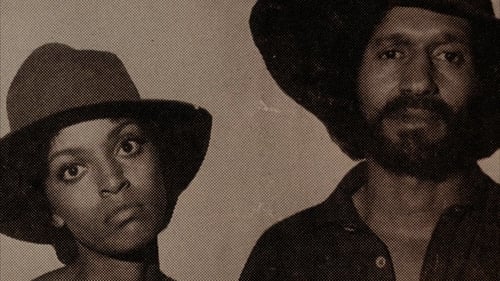
Director
Katy Martin paints directly on her skin, and uses her whole body to make marks with the paint. Bill Brand frames the action and its trace, in the process, linking painting and cinema. Swan's Island explores gesture in painting, and how it relates to the hand held camera. The film creates abstractions from the glistening blue paint that in turn evoke a seascape or a distant, yet intimate place. In its choreography, Swan's Island is a duet. The painted figure occupies space, and the camera describes that space. The person filming and the person filmed are moving as one, and yet they are separate, each an island. Seeing and being seen are inextricably bound with emotions of love and loss, longing and a sense of place.

Director
Skinside Out features paint on skin, carried out in an expressionist mode on both of the filmmakers' bodies. The emphasis is on the pleasure of looking -- at the edge of repulsion -- and the implications of making public an essentially private gesture. The film posits painting as a gendered, bodily act, whose location shifts continually within a context that's always changing. Images filmed in the studio are juxtaposed with footage of a construction barge along the Hudson. By examining both in relation to surface, the work paradoxically looks for what lies within, while questioning who and where we take ourselves to be.

Director
"HANAFUDA observes the artist, Jasper Johns, and the master Japanese silkscreen printers at Simca Print Artists, as they created three different images from Johns USUYUKI and CICADA series. For me, the camera was a pretext for an in-depth apprenticeship. The finished film recapitulates my process of learning, gleaned over time, as I observed Johns and the printers at work. What I wanted to know was how one generates a work of art and, for that matter, what is art, what work is involved, and how do ideas as opposed to physical labor drive the decision making process. The films became a meditation on art and craft, as well as on the dialectic of mind and body, concept and actual work." -Katy Martin.

Director
"SILKSCREENS follows the choreography of printmakers at work, pulling the edition of Jasper Johns' print, THE DUTCH WIVES. It was filmed at Simca Print Artists in New York. I got the notion of repetitive labor as a form of dance from the French painter, Edgar Degas. No doubt, I was also influenced by minimalism with its impetus to integrate normal, workaday movements into fine art. For the sound track, I worked with the musician, Richard Teitelbaum (who in turn had worked with John Cage). We used ambient sounds from the print shop and the street outside to reflect the kind of hearing that you experience as you work, when sounds float in and out of consciousness. The artist, Jasper Johns, does not appear in this film. My next film, HANAFUDA, focused on Johns at work with the printers at Simca." -Katy Martin.

Mrs. Charlotte Tyler
A pair of thieves operate in the American South between 1911 and 1915, stealing from rich, white capitalists, and giving to Mexicans, Native Americans and poor whites.



